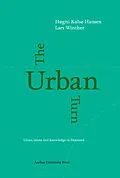With emerging new markets and strong competition from low-wage countries, globalisation processes have transformed the economies of Denmark and Europe. As a result, 'know-how' and 'innovation' have become key focus points for many firms in their quest for economic growth. Firms not only need talented employees but also proximity to the knowledge institutions, markets, and global linkages that are available in the large urban regions. Presenting an overview and analysis of the contemporary location, distribution and dynamics of economic activity, The Urban Turn, with focus on the knowledge economy and talent, emphasises the importance of cities and city regions for the generation of economic growth in modern capitalism. The aim of the book is to examine the relationship between the knowledge economy and city regions, and the way in which this relationship challenges local and regional development. The Urban Turn will appeal to scholars and master students of human geography, urban and regional studies and planning, city planners and people with an interest in the spatial dynamics of contemporary capitalism.
Klappentext
The book is an overview and analysis of the contemporary location, distribution and dynamics of economic activity, uneven geographies of growth and the local economic development processes. Focus is on the localisation of the knowledge economy and talent, e.g. the part of the labour force which is central to the production, use and distribution of knowledge. The urban turn emphasises the importance of cities and city regions as the key places that generates economic growth in modern capitalism. The resurgence of large cities has happened concurrently with the rise of the knowledge economy and together with the increased use of talent. Thus, this book examines the relationships between the knowledge economy and city regions and how this challenge local and regional development.
